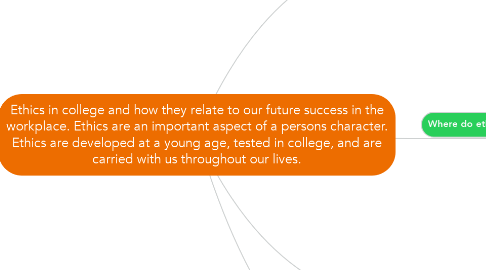
1. Ethics in College
1.1. Is plagiarism still a problem in college today?
1.1.1. In surveys of 14,000 undergraduates conducted over the past four years by Donald McCabe, PhD, a business professor at Rutgers University and co-founder of Clemson University’s International Center for Academic Integrity, about two-thirds of students admit to cheating on tests, homework and assignments. And in a 2009 study in Ethics & Behavior (Vol. 19, No. 1), researchers found that nearly 82 percent of a sample of college alumni admitted to engaging in some form of cheating as undergraduates. http://www.apa.org/monitor/2011/06/cheat.aspx
1.2. How are unethical students dealt with?
1.2.1. Studies have found that teachers often do not agree on the types of punishment appropriate for academic dishonesty. http://search.proquest.com.ezproxy2.apus.edu/psycarticles/docview/614421083/fulltextPDF/F99CBE6AFCC6432APQ/1?accountid=8289
1.3. Can ethics be taught?
1.3.1. "Lawrence Kohlberg discovered that when his subjects took courses in ethics and these courses challenged them to look at issues from a universal point of view, they tended to move upward through the levels of ethical development." http://www.scu.edu/ethics/practicing/decision/canethicsbetaught.html
2. Where do ethics begin?
2.1. What are ethics? Is everyone's definition the same?
2.1.1. "First, ethics refers to well-founded standards of right and wrong that prescribe what humans ought to do, usually in terms of rights, obligations, benefits to society, fairness, or specific virtues. Ethics, for example, refers to those standards that impose the reasonable obligations to refrain from rape, stealing, murder, assault, slander, and fraud. Ethical standards also include those that enjoin virtues of honesty, compassion, and loyalty. And, ethical standards include standards relating to rights, such as the right to life, the right to freedom from injury, and the right to privacy". http://www.scu.edu/ethics/practicing/decision/whatisethics.html#sthash.MU2djoK0.dpuf
2.2. When do we develop ethics?
2.2.1. "Harvard psychologist, Lawrence Kohlberg found that a person's ability to deal with moral issues is not formed all at once. Just as there are stages of growth in physical development, the ability to think morally also develops in stages". http://www.scu.edu/ethics/practicing/decision/canethicsbetaught.html
2.3. Does a parent-child relationship play a role in the development of ethics?
2.3.1. "What is it about receiving harsh physical discipline in childhood that leads to a decrease in academic integrity among college students? One possibility is that the use of this type of physical discipline disrupts the development of healthy parent-child attachments, hi this connection, prior research has shown that poor parent-child attachments are associated with an increase in externalizing behavioral problems such as lying and stealing (Fearon et al., 2010; Rothbaum & Weisz, 1994). Relatedly, it may be that adolescents who have experienced disruptions in their relationships with their parents are more likely to cheat in college than those who have stronger bonds with their parents because of a decreased level of respect they have for authority figures". http://search.ebscohost.com/login.aspx?direct=true&db=aph&AN=98748701&site=ehost-live&scope=site
3. Ethics in the workplace
3.1. Ethics in the workplace and how it effects everyone
3.1.1. A mounting body of evidence shows that an emphasis on the softer sides of business, including ethics, positively influences the harder traditional bottom line. By listening to employees, effectively recognizing their work, and practicing good ethical behavior, managers have given a boost to such hard measures as operating earnings, ROI, and stock price. http://gbr.pepperdine.edu/2010/08/creating-and-sustaining-an-ethical-workplace-culture/
3.2. Enron and how the unethical decisions of some effected the lives of many
3.2.1. Thousands of Enron employees lost their life savings and retirement plans. web.bryant.edu/~agudikun/enronacgrevised.doc
4. Resources
4.1. http://www.scu.edu/
4.2. APUS Library, Academic Search Premier
4.3. http://gbr.pepperdine.edu/
4.4. http://www.apa.org/
4.5. web.bryant.edu/~agudikun/enronacgrevised.doc
4.6. Resource reliability
4.6.1. The resources cited are found the be reliable due to the fact that they are found on college websites. They are written by professors in the specific field of study or individuals with PhD level educations who have studied or work in the area of ethics.
